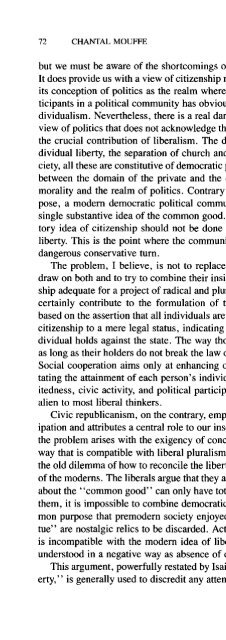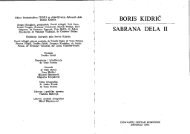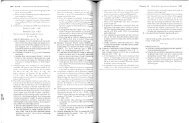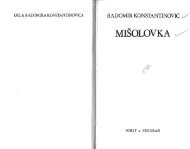Chantal Mouffe
Chantal Mouffe
Chantal Mouffe
Create successful ePaper yourself
Turn your PDF publications into a flip-book with our unique Google optimized e-Paper software.
72 CHANTAL MOUFFEbut we must be aware of the shortcomings of the civic republican solution, too.It does provide us with a view of citizenship much richer than the liberal one, andits conception of politics as the realm where we can recognize ourselves as participantsin a political community has obvious appeal for the critics of liberal individualism.Nevertheless, there is a real danger of coming back to a premodernview of politics that does not acknowledge the novelty of modern democracy andthe crucial contribution of liberalism. The defense of pluralism, the idea of individualliberty, the separation of church and state, the development of civil society,all these are constitutive of democratic politics. They require distinguishingbetween the domain of the private and the domain of the public, the realm ofmorality and the realm of politics. Contrary to what some communitarians propose,a modern democratic political community cannot be organized around asingle substantive idea of the common good. The recovery of a strong participatoryidea of citizenship should not be done at the cost of sacrificing individualliberty. This is the point where the communitarian critique of liberalism takes adangerous conservative turn.The problem, I believe, is not to replace one tradition with the other but todraw on both and to try to combine their insights in a new conception of citizenshipadequate for a project of radical and plural democracy. While liberalism didcertainly contribute to the formulation of the idea of a universal citizenship,based on the assertion that all individuals are born free and equal, it also reducedcitizenship to a mere legal status, indicating the possession of rights that the individualholds against the state. The way those rights are exercised is irrelevantas long as their holders do not break the law or interfere with the rights of others.Social cooperation aims only at enhancing our productive capacities and facilitatingthe attainment of each person's individual prosperity. Ideas of public-spiritedness,civic activity, and political participation in a community of equals arealien to most liberal thinkers.Civic republicanism, on the contrary, emphasizes the value of political participationand attributes a central role to our insertion in a political community. Butthe problem arises with the exigency of conceiving the political community in away that is compatible with liberal pluralism. In other words, we are faced withthe old dilemma of how to reconcile the liberties of the ancients with the libertiesof the moderns. The liberals argue that they are incompatible and that today ideasabout the "common good" can only have totalitarian implications. According tothem, it is impossible to combine democratic institutions with the sense of commonpurpose that premodern society enjoyed and the ideals of "republican virtue"are nostalgic relics to be discarded. Active political participation, they say,is incompatible with the modern idea of liberty. Individual liberty can only beunderstood in a negative way as absence of coercion.This argument, powerfully restated by Isaiah Berlin in "Two Concepts of Liberty,"is generally used to discredit any attempt to recapture the civic republican
















